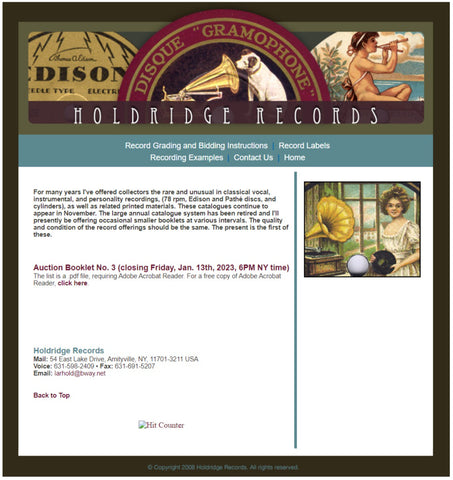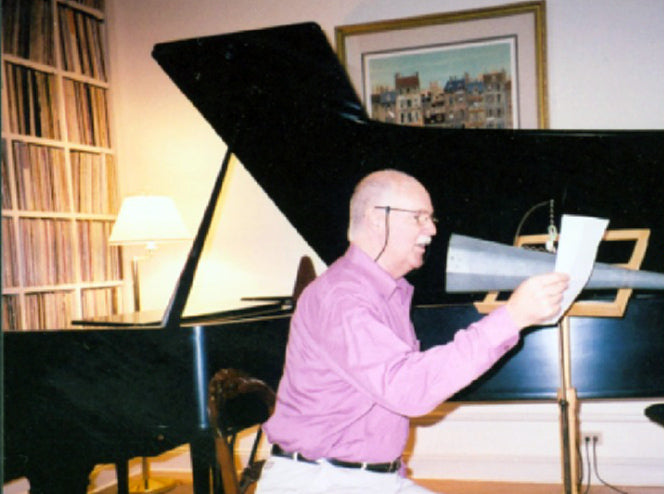Farewell to Record Collector Larry Holdridge May 02 2023
Record collector and dealer Larry Holdridge - a unique and important member of the classical music community passed on February 7th, 2023. Lawrence “Larry” Holdridge of Amityville, New York was 83 years old and died after a short illness. His key place in the current music scene was little known, and he probably will not and cannot be replaced. To understand why one must remember that only in recent years has the existence of historical recordings and their importance begun to be understood as crucial for our understanding of musical history.
Composers and performers born as far back as two hundred years ago left recordings, most of which are miniature Rosetta Stones, containing coded information about true style and “the composers’ intentions.” That a wide public today has access to these recordings, many of which are rare and a few even unique, is the result of the work of a small band of musicians, musicologists and scholars who have gathered these documents and made them available, using advances in recording technologies.

View of Larry Holdridge's website Holdridge Records
All of us owe Holdridge a debt of gratitude for his unique part in these efforts. A working musician and teacher, he understood decades ago not only the artistic value of the old records, but also the immense difficulty involved in finding perfectly usable copies of many of them. His efforts largely solved that problem for much of that small band, where he had become legendary.
As another legend in the field, critic/author Conrad L. Osborne, recently observed, Larry was “... for so many years a lamp unto the feet of historical record collectors all over the world.” Speaking personally, he had been a ’secret weapon’ in the reissue production work of Ward Marston and myself for several decades.
His musical talent was obvious from an early age. While in college Holdridge wrote the scores for at least two musicals, one titled “Social Event” and another “Two Tickets to Heaven.” A recording of them that I have heard shows he had real talent. After graduating, he married and started a family, and became a music teacher and choral director at a high school on Long Island for several decades.
Choirs he directed won prizes, he mentored students and was much beloved by them. A few aspired to careers in music and he played the piano accompaniments at their recitals. At some point he discovered the importance of old records and began to gather them. A limited budget was probably the reason he decided to raise money to support his collecting by becoming a part time dealer in old records himself. His first efforts as a dealer were modest and unremarkable.
Larry discovered that several of the artists on those old records were still alive. He found their addresses and wrote to them, starting correspondences that prompted the artists to discuss their recordings. Among them were former stars with big names, but also singers like T. Foster Why and Edith Helena, and the conductor Frieder Weissman.
Many of their names are forgotten today, although the pianist/composer Leo Ornstein, then approaching a hundred years old, was enjoying seeing his reputation rehabilitated when he signed some records for Larry. Frieder Weissman was the conductor on hundreds of the old records of singers and of early orchestra recordings. He had been the husband of one the greatest sopranos of all time, Meta Seinemeyer, whose records from the 1920s are revered. Although in his 80s,Weissman was looking for new engagements and asked Larry to help find them.
Larry worked hard to assist Weissman, among other things arranging for a reissue of some of his old recordings onto new LP discs, and landing him an interview on the New York Times radio station. Larry wrote to dozens of impresarios, concert managers and opera directors – Rudolf Bing, Beverly Sills, Columbia Artists and so on – but no one wanted to hire the old gentleman. Weissman sent Larry dozens of letters, one of which states “No manager ever did or tried to do as much.” Weissman was always grateful, but definitely made a pest of himself.
And somehow while all this was going on an unknowable alchemy took place, for it wasn’t many years after starting to offer records for sale that Larry Holdridge transformed himself from an ordinary record peddler into the greatest rare record dealer I’ve ever known, this opinion after my decades-long career devoted to professionally collecting records (while assembling the collection of the International Piano Archives now at the University of Maryland).
To my mind there were basically three elements that made him the greatest. His naturally winning persona caused almost everyone to like and trust him. It was genuine, and allowed him to easily negotiate the personality difficulties often associated with collectors and the heirs of collectors selling collections.
Then, his discernment was royal, and he had an understanding of all perspectives pertaining to the importance of old records, something rare in the niche world of collecting, where “received opinions” pass for knowledge. And his canny solution to the problem of the best way to make the records available was one of the rarest of the talents that somehow emerged in him. He did it by producing unrivalled catalogues of records for auction, unique not just for the content, but also for the quality of records offered.
Larry’s yearly catalogues are the only ones ever issued by a record dealer that are eagerly themselves collected as reference material and still pleasurable reading. They were filled with mini biographies and stories of long dead and forgotten artists who had made records, the results of his constant research. These often reflected his quiet sense of humor. For example, a good friend remembered him discussing a 19th century soprano who could have recorded, but didn’t, calling her “Die Frau ohne Schallplatten.”

Photo taken in 2001 of Larry Holdridge recording a cylinder. He and Ward Marston had produced a reissue of Edison cylinders and won an award from the British magazine Classical Record Collector. They recorded their acceptance speeches on cylinders which were played at the awards ceremony in London.
As for quality, when his catalogue stated that a record was perfect, it was perfect. And he went out of his way to find, list and sell the quietest pressings with the quietest surfaces. This is important, for in our technology drenched world, where there is no end to discussion of computer programs and sound equipment that can do wonders in restoring old recordings, often overlooked is the most important element to such restoration: one must start with as nearly perfect copies as possible, pressed originally on the quietest surfaces as can be found. Such examples are rare indeed. When acquiring a collection, he often disposed of 90 percent, reserving only the smallest portion, those records that were “like glass” for sale to his customers.
In the course of accomplishing this over the years, he became a mainstay of the New York-based Vocal Record Collectors Society, a constant attendee at the Metropolitan and other opera houses, an ardent supporter of Teatro Grattacielo (a professional opera company based in New York City specializing in concert performances of rarely heard verismo operas), a writer of liner notes for historical reissues and a producer of many, and a constant friend and aid to almost all concerned in the field. Many highly respected authors such as William Ashbrook and Michael Henstock relied on his input in their work. His quiet generosity stood out and will be remembered.
Two years ago Larry lost his wife Jan, and he slowed down but never stopped. Their daughter Laurette and her own family must have wondered, like almost everyone else outside the world of historical recordings, just what was all the old record stuff about? Let me assure all that Larry not only loved the way music was once performed (knowing that because it was captured on old records), but that he was uniquely important to musical scholarship.
(written by Gregor Benko)
RELATED BLOG ARTICLES:
- The Mapleson Cylinders: Live at the Met 1900-1903
- Farewell to Roger Gross (1938-2013)
- The Pedro Corrêa do Lago Autograph Collection
- Aldo Mancusi - Founder of the Enrico Caruso Museum of America
- Autograph Collectors of the Past: Louis Koch
Interested in authentic autographs?


